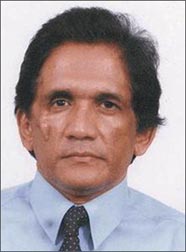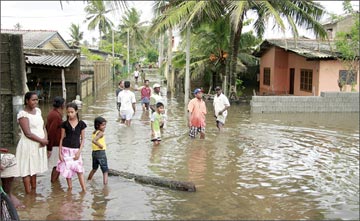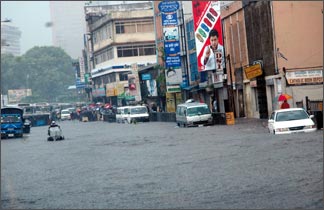Disaster Management Centre ready to face calamities
By Ranil WIJAYAPALA
|

Major General (retd) Gamini Hettiarachchi
|
The recent floods in many parts of the country, especially in the
Western province caused panic among the public. It provided a hot topic
for the media and politicians to split hairs on the situation and
discuss ways and means to mitigate the crisis. However, floods may not
be the only disaster the country would face in the future.
Cyclones, tornadoes and earthquakes will also threaten the country in
future. The Sunday Observer contacted the Director General of the
Disaster Management Centre, Major General (retd) Gamini Hettiarachchi
and M.U.W.L. Chandradasa, Director, Disaster Mitigation to have a clear
idea about the recent flood situation and also about the disasters that
may threaten the country in future.
Here are excerpts from the interview the Sunday Observer had with
Major General (retd) Gamini Hettiarachchi and M.U.W.L Chandradasa.
Q: How does the Disaster Management Centre assess the recent flood
situation ?
A: According to the situation reports we received more than 600,000
people were affected by the floods in almost 10 districts especially in
the Western and Southern provinces. This number was reduced to less than
100,000 by end of the week and all those who were living in IDP centres
have returned to their homes. Over 20 deaths were reported. About 740
houses were fully damaged and 3990 were partially damaged. Water was
receding in most of the areas and a normal situation was reported by
this weekend.
|

A Colombo suburb flooded in the recent deluge |
Q: What was the main reason for the floods ?
A: One is excessive rains. Our systems were also unable to cope with
the situation. The rainfall in Colombo and Gampaha was severe. The
people who were affected were mainly from Colombo and Gampaha districts.
In addition the people in seven other districts were also affected.
In some areas it was due to the drainage systems not being properly
maintained that the flood situation got aggravated. Especially in
Colombo, the drainage system which is over hundred years old as reported
recently had not been properly maintained. The Municipal Council alone
cannot face this situation as funding is a big problem for them.
The other thing is that lots of low lying retention lands have been
invaded by unauthorised settlers. Consequently even during a slight rain
these areas go under water. It has become a common practice for the
people to come to IDP centres once or twice a year when there are
floods. In some areas people do not leave their homes even when there is
flood at knee level fearing that they would lose their properties.
Add to this situation is the garbage problem. People continue to dump
the garbage into the canals. When we complain against this practice they
charge that the garbage is not being collected properly. That also
contributed to the problem of flooding.
Q: How did the Disaster Management Centre handle this situation ?
A: Our system had been organised to face this type of situations.
Upto May 21, the Ministry of Disaster Management had allocated over Rs.
35 million to provide relief to the flood victims with cooked meals and
dry rations.
We allocated Rs. 10 million to Colombo district, Rs. 5.8 million to
Galle district and Rs. 5 million to Gampaha district from the Disaster
Management Ministry funds.
|

A busy Colombo street under water |
Apart from this we had also released Rs. 2.5 million to all flood
affected districts for emergency operations such as hiring backhoes,
cleaning drains, additional expenses for removing landslide debris and
clearing of roads. We gave roughly about Rs. 300,000 for a district for
these operations.
Q: Was this situation not anticipated ? There are complaints that no
proper action was taken to mitigate such a situation ?
A: No, we did not expect a situation such as this. We had taken a
series of measures necessary to mitigate such situation over the past
few years. Our Minister held meetings on May 3 at the Colombo Municipal
Council regarding the cleaning of canals. We also held meetings at
Moratuwa and Kolonnawa on May 5 regarding this issue. Again, on May 6 we
had a meeting at Dematagoda and a relief services meeting on May 7.
Again there were meetings held with Maharagama Pradeshiya Sabha and
Divisional Secretaries. All those meetings were chaired by the Minister.
The Disaster Management Centre also held a meeting at the DMC itself,
since our role was to coordinate matters regarding floods with other
agencies such as Land Reclamation Corporation, the Local Government
authorities and the Irrigation Department. We provide the funds to
mitigate the impact of floods.
In our assessment of the flood situation we identified the measures
to be taken to mitigate the severity of the floods. We gave funds to the
Land Reclamation and Development Corporation to clean the canals in a
number of districts over the past few years.
In the Colombo district alone, Weras Ganga in Kesbewa and Moratuwa,
Katu Ela in Kotte, Maharagama, Field Avenue Ela, in Dehiwala,
Maharagama, Boralesgamuwa Ela in Kesbewa, Thel Ela in Ratmalana,
Thelawala Ela in Maharagama, Madiwela Meda Ela, Maharagama,
Kadiranawatta Ela, Mattakkuliya Ela, Kimbula Ela and Mutwal canal in
Colombo and a number of canals in Kolonnawa area were some of the canals
we cleaned prior to this rainy season. In the past few years we also
cleaned lots of other canals in other districts as well. Unfortunately,
it is the lack of maintenance of these canals that created problems.
We sought the assistance of the Colombo Flood Committee to identify
the authorities responsible for maintaining these canals. In Colombo we
have identified the canals which have no authority responsible for
maintenance. We are handing over them to relevant authorities to take
over their maintenance. But the major issue today is the lack of funds
for the maintenance of these canals.
We also have to tackle the problem of unauthorised filling of
retention lands. In some areas the authorities are unable to visit the
sites because underworld gangs are operating. There are some areas in
Maharagama where even the Divisional Secretary is unable to visit the
sites. He wanted military escort to visit those areas. Kolonnawa is
another such area.
Q: No one was however willing to take the responsibility for the
situation created in Colombo. Why was this ?
A: There are major canals in Colombo, maintained by different
organisations. Some are doing their job while some are not. There are
canals which are not maintained by anybody. Nobody knows who is
responsible for the cleaning of these canals. These are the problems we
are facing. We are in the process of identifying the organisations
responsible for the maintenance of those canals. We have identified that
there are 14 major canals where nobody is responsible. People start
filling those canals and selling the reclaimed lands. There are other
issues too relating to floods.
We have to tackle the problems relating to cleaning canals, garbage,
unauthorised filling of retention areas, removal of unauthorised
structures on the banks of canals as the authorities are not taking
proper action to address those issues.
Q: What steps did the DMC take soon after the floods ?
A: When the floods hit those areas we coordinated with the relevant
agencies to provide relief for those affected. We coordinated with the
UNHCR, UNICEF, IOM, CARE and other INGOs to provide relief for those
affected. These agencies provided us the items needed.
As urgent measures we identified the areas in Colombo, Ja-ela and
Gampaha and cleared the muck that blocked the canals and dredged the
canals to drain out the waters. At Rattanapitiya we are constructing a
new bridge. We coordinated the work with the relevant authorities.
In other districts, over the past few years the DMC had given 100
boats with outboard and 150 catamarans for Local Government Bodies in
different districts to be used during floods.
Q: Is there any proper mechanism to help the people when they are
affected by floods of this nature. There were some allegations that the
Government mechanism was not efficient enough to provide relief to the
affected people ?
A: Of course, the Government has a proper mechanism. In Districts we
have District Secretaries, and under them the Divisional Secretaries and
the Grama Sevaka. The mechanism functions smoothly in our administration
down to the basic grass roots level. It is through that network we are
handling the situations such as this. The Grama Niladaris know what are
the areas getting inundated and the people to be evacuated first. That
much of knowledge is there.
There are two levels at which assistance has to be provided. One is
food. The other is post-flood situation. The allegation is that the
victims are not properly looked after since there is no place for them
to go, their houses being inundated.
The food part is handled by the Relief Centres, the GA, divisional
secretaries and the Grama Niladaris. It is their task. The situation
largely depends on the person handling the situation. The political
authorities too get involved themselves as certain Grama Seva Niladaris
are not active in some areas. In these instances our people are also
supervising the situation. They identify areas which had to be given
priority. We check back whether those areas have received their food or
other requirements.
Our mechanism is such that when we received a call from any part of
the country we make sure that proper action has been taken to alleviate
the distress through our network in the districts.
The next step is to get the affected houses cleaned for the people to
return soon. We have got down some water pumps to clean the wells and
the Health Department has provided the resources to chlorinate the wells
and until such time the people can't go back.
Not only the Government the Local Authorities too have to clean and
maintain the drains, while the Irrigation Department has to do its part
in cleaning the canals.
Of course, The system is there. People also can find fault with
anybody!
Q:The rainy season has not ceased. The monsoonal rains are yet to
come. There is in alarming threat about landslides. Is the DMC prepared
to face such a situation in the future?
A: Our preparedness for the landslides is such that we keep informed
the people in the landslide prone areas, of the impending threat. People
are already aware of the imminent danger. They are aware that they have
to move out of the area when there are heavy rains. Now they know where
to go in such situations because we have identified the safe locations
for them.
With regard to landslides we have mapped out the landslide-prone
areas. We have linked up with the National Building Research
Organisation to warn the people about possible landslides. Through the
DMC we keep informed of the District Secretariats, District Coordinating
Officers, Divisional Secretariats, Police Stations and the media. We
give warning to the people to take appropriate action.
Apart from that we have introduced rain gauges to measure the
rainfall. They will be distributed among the people in landslide-prone
areas. So they can measure the rainfall and move out of the areas when
the rainfall is at a dangerous level. We have mapped out the safer areas
for the people to move in, in case of a landslide. So they can make
their own decisions depending on the rainfall.
Q: There is a great danger of landslides due to heavy rains. What are
the reasons for the large scale landslides?
A: There are lots of earthslips in town areas due to cutting of
vertical slopes downwards. Due to this situation the upper houses also
get affected. In Nuwara Eliya area some cultivation practices also
create lots of problems. The tobacco cultivation is an example.
Earlier they had the paddy cultivation. That was one method of
preserving the lands. Due to the paddy cultivation system the water
collected in the upper lands systematically drained into the water-ways.
But due to the hapazard cultivation methods, such as tobacco
cultivation, lots of rain water collected in the upper lands causing
landslides.
Q: Why was there such a serious situation ? Is it due to lack of a
regulatory mechanism on the use of lands?
A: About the land use there is no proper regulatory mechanism. Now
the National Building Research Institute is studying and identifying the
lands which are not suitable for cultivations. That is the only
mechanism we have in place to regulate the use of lands.
Q: President Mahinda Rajapaksa has instructed all the relevant
authorities to make a combined effort to overcome the flood situation.
What follow up action has been taken in this regard?
A: Actually we had a meeting with the President. At this meeting the
Land Reclamation and Development Corporation was asked to maintain the
major canals. The Local Government Authorities were instructed to clean
all the gullies and drains in their areas.
The Irrigation Department was also asked to improve all their canals
and maintain then properly. The Urban Development Authority was
instructed to plan out the areas available for rain water retention.
They were also asked to identify unauthorised structures in these
retention areas and take action to relocate them. The Housing Ministry
is handling the relocation process. Likewise all the organisations were
given instruction to pursue action to overcome the situation.
Now the Disaster Management Minister is conducting conferences and we
are drawing up plans. We are also collecting the relevant information.
For instance, we have identified the canals that have to be cleaned in
the Colombo Divisional Secretariat areas. The Defence Ministry is also
collecting the necessary data to draw up their plans.
Q: Apart from floods and landslides what are the other disasters that
may threaten the country in the future?
A: Apart from the floods we have to face cyclones as well. The period
from October to January is the cyclone period. We keep the people ready
for this situation. Then there is the drought period in the North
Western Province and Moneragala and Hambantota districts. This year it
may be from August to October. We are keeping the people informed of
this and getting ready to provide them with water. However, this year
the drought will not be a severe one.
Other than that we will be concentrating on the lightning and
educating the people to take precautionary steps.
In addition, we are also concentrating on Tornadoes that could affect
our coastal areas. We are educating the people to strengthen their roofs
so that it will not be blown off. The technical experts are studying the
situation to educate the people in the coastal belt as how to construct
buildings to face such situations.
We are also drawing our attention on earthquakes. We had a few
tremors last year. We are going to make people aware of the situation
and make a serious study on the situation as we are rather prone to
earthquakes. For that we are working with Universities.
Pix Wimal Karunathilaka, Dushmantha Mayadunna
|

